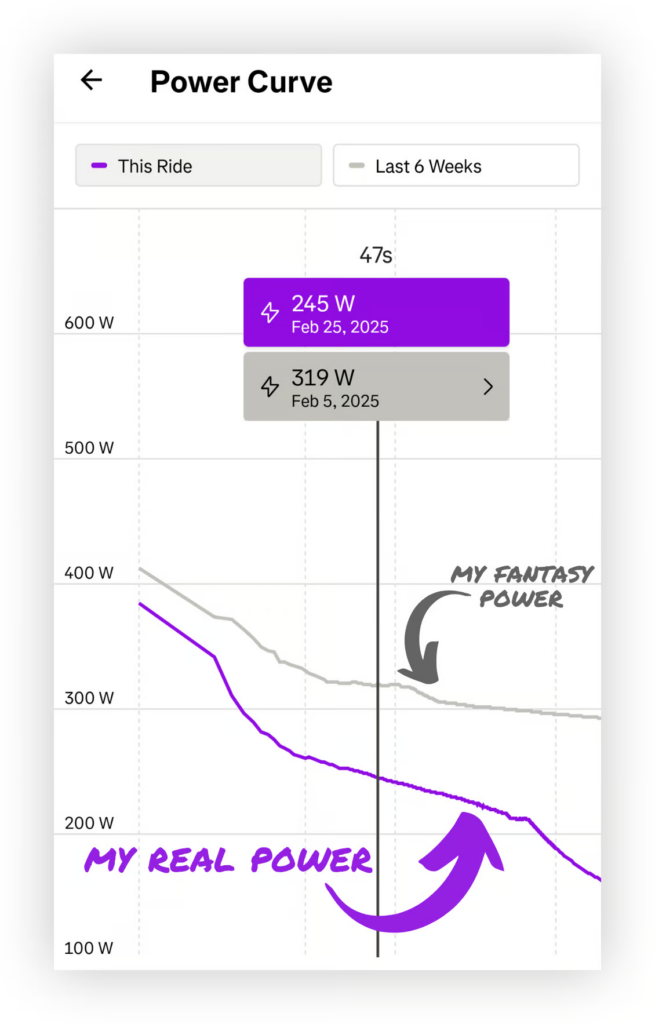I finally faced what I’ve been putting off for a couple of years… an FTP test.
For the uninitiated, a Functional Threshold Power test measures how much power you can exert over a certain amount of time. And, full disclosure, if you’re doing it right, it’s bloody awful.

So why do it?
Well, for starters, it’s how our devices know if we’re working hard or hardly working during each activity.
Your FTP is the number your device uses to calculate your power zones. And the combo of power and heart rate is how Garmin estimates your cycling VO2 max, arguably the most important metric of all.
And it all begins with good data! For that, we need two things:
- An accurate power meter and,
- A chest strap for accurate heart rate data.
There are different protocols for the test but the most common is the 20-minute test.
After a warm-up, it’s go-time. You ride as hard as you can for 20 minutes. When it’s over, you’ll know your 20-minute, average power expressed in watts.
Your FTP is 95% of your average 20-minute power.
Five percent is deducted because what you really want to know is the maximum power you can sustain over 60 minutes. But a 60-minute FTP test is cruel and unusual punishment. Even the pros rarely do it.
I was prepared right down to a mental game plan. The ride was brutal, but I sustained my target watts to the final seconds. When my watch buzzed and released me from the torture, I gasped for air and waited for the slight wave of nausea to pass as I cooled down with an easy spin. I felt elated. It was done and I’d managed the test.
Going into my test, my FTP was 208 watts. Coming out, it was 269.
It couldn’t be. And now it was on Strava. I suspect my Strava friends were too kind to debunk the number. A couple even congratulated me. 🫤
I whipped into research mode. Gaaah! My FTP is in league with Cat 1 racers—not in my age category—in general!

I screwed up my test!!!
Despite my copious preparation I forgot one little step: I didn’t calibrate my Garmin Rally pedals (they measure power), a 10-second step, and now the test is junk.
And bad data cannot stand. It pollutes everything else. So it’s back to the pain cave for me. Gaaaah!
If you haven’t done an FTP test in a while, I hope you do. And in the spirit of sharing, here’s how to…
…Nail your FTP Test (the first time):
1. Dial in your tech
Calibrate your power meter:
- Control your environment: cold weather or dramatic changes in temperature can cause drift in your data.
- Garmin Rally pedals need to be calibrated each ride
- Make sure to set your crank length in your settings (and adjust when swapping to different bikes)
- Keep your firmware updated and batteries charged (low batteries can decrease accuracy)
- If your power meter is hub-based, make sure your skewer is tight
Get a heart rate chest strap. Tour riders wear chest straps because the data is more accurate. I never use mine, opting for the optical sensor in my watch. But I’m using it now and realizing my HR is consistently higher than my watch reports. Once you set your chest strap up under “Sensors” in your watch, anytime you wear it, it will automatically override the optical sensor in your watch.
2. Mental Preparation
Preparation begins with a good night’s sleep. If your body battery and HRV are running low or yesterday was leg day in the gym, cut yourself some slack and do it another day.
Ideally, take a rest day the day before.
Now you’re ready.
Before you throw a leg over your trainer, get mentally prepared. This is all about pacing.
Start Controlled, Not Aggressive
The first 3-5 minutes should feel hard but sustainable—if you’re gasping early, you’ve overcooked it. You want to settle into a steady rhythm within the first minute.
Find Your “Sweet Spot” Early
Based on my last FTP test I had a target watt, e.g. 208 (+/- 5) that I wanted to hold for the first 10 minutes. Make it a bit higher than your last test. And if you don’t know your FTP, pick something hard that you hope to hold for 10 minutes. At 10 minutes assess. If you feel strong, go a bit harder. If you feel like you’re dying, dial it down slightly. And keep an eye on your cadence. The most common cadence for an FTP test is 85 to 95 RPM.
Last Five Minutes
Dig deep, friend. I wanted to QUIT at the 15-minute mark. But you gotta hold on. You’re three quarters of the way there. Are you going to give up? Hell no, you’re not! If you’re not dying, ramp it up a bit. You want to leave it all on the bike.
Instead of thinking “20 minutes of suffering,” it helps to break it into chunks:
- First 5 minutes: Settle into a rhythm.
- Next 5 minutes: Hold steady.
- Next 5 minutes: Push slightly harder if possible.
- Final 5 minutes: Give everything you have.
3. Execution
Don’t overlook your warmup. I took my guidance from Olaf Alesander Bu. He’s the star coach and sports scientist to the two most accomplished triathletes on the planet.
Here’s his 20-minute warmup plan for your FTP:
- 0-6 minutes: soft pedal
- 6-12 minutes: mid heart rate zone 2
- 12-15 minutes: threshold zone
- At 15 minutes throw in 2 or 3 VO2 max efforts for 10 to 15 seconds to wake everything up
- Easy pedal for the last few minutes
Do’s and Don’ts:
✅ Get your playlist ready to go. Whatever music lights a fire under you… blast it. And settle into your pacing.
✅ At this point your heart and muscles are ready to go. If you need a bathroom break, take it!
✅ If you started a ride on your watch, discard it and start a new one so that at the end of your 20 minutes, you have your FTP and it isn’t averaged out with your warm up. At 20 minutes, stop that ride!
✅ Turn those pedals for 10 minutes to cool down. You may feel AWFUL but you’ll feel better soon.
✅ Some quick-digesting carbs in the lead up provides some energy. I scarfed down a handful of blueberries as I was getting into my lucky bibs.
❌ Don’t try this on a full stomach. Give yourself a couple of hours after your last meal.
❌ Skip salty electrolytes in your bottle. I always ride with LMNT but it made me thirsty and created a bit of a distraction. I’ll go with plain old water for the next one.
❌ Don’t wait for two years. Testing every few months let’s you know where you stand.
Did I miss anything? Email me if you’ve got a tip for me. ‘Cause guess what? I have to do it all over again.
Say a 🙏 for me! I’ll report back from the pain cave.
Kelly